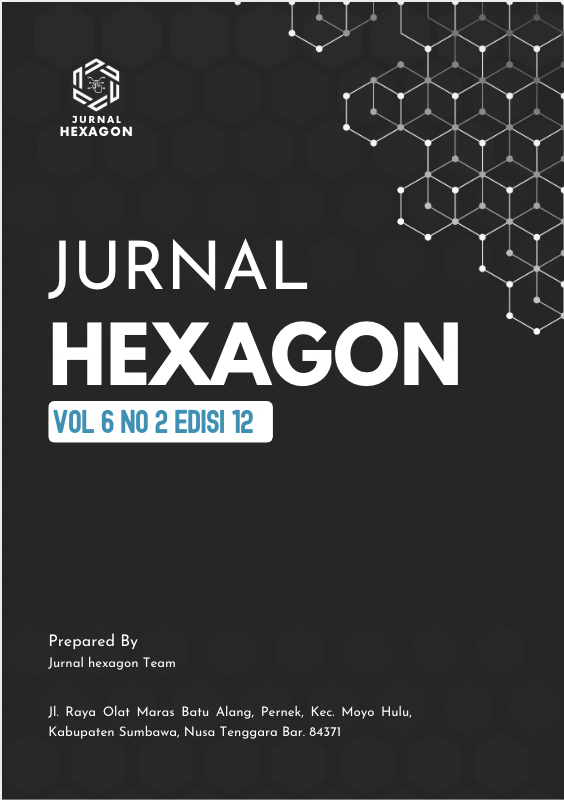USULAN TATA LETAK MATERIAL DAN PERLUASAN GUDANG PADA PROYEK PEMBANGUNAN BENDUNGAN TIU SUNTUK PAKET 1 MENGGUNAKAN METODE CLASS BASED STORAGE
DOI:
https://doi.org/10.36761/hexagon.v6i2.5370Keywords:
Material handling, Tata Letak, Gudang, Class Based Storage, Layout UsulanAbstract
PT Nindya Karya is a state-owned enterprise (SOE) engaged in construction services, currently undertaking the development of the Tiu Suntuk Dam project located in West Sumbawa Regency, Indonesia. Based on field observations, it was found that the existing warehouse layout was disorganized, with material placement lacking clear structure, thereby hindering warehouse staff in locating and retrieving required items. Additionally, due to limited storage capacity, not all materials could be accommodated within the warehouse. This condition prompted the need for further study to minimize material damage and inefficiencies in retrieval processes caused by poor organization. This study aims to improve warehouse capacity and layout by implementing the Class-Based Storage method, which categorizes materials into three main classes based on their type and dimensions. As a result, the warehouse was expanded from its original size of 4.7 m × 10.6 m to 14 m × 32 m. The proposed layout organizes materials into three classes: Class 1 comprises solid materials with lengths ranging from 3 to 12 meters; Class 2 includes solid materials shorter than 3 meters; and Class 3 consists of liquid or flammable materials. The analysis showed that the total material handling cost in the initial layout was Rp 2,246,674, which was reduced to Rp 1,068,060 in the proposed layout, indicating a cost efficiency gain of 52.4%. These findings confirm that the Class-Based Storage method is effective in optimizing warehouse layout and reducing internal logistics costs. The study offers practical contributions to warehouse management in construction projects and may serve as a reference for the layout planning of similar infrastructure facilities.
References
Adiasa, I., & Mashabai, I. (2024). Perancangan Ulang Tata Letak Fasilitas Menggunakan Metode Systematic Layout Planning (SLP) Dengan Alogaritma Blocplan Di UD Wijaya Samawa. Industrika?: Jurnal Ilmiah Teknik Industri, 8(1), 54–66. https://doi.org/10.37090/indstrk.v8i1.1081
Adiasa, I., Sartika, & Hudaningsih, N. (2023). Perancangan Tata Letak Fasilitas Gudang Pada Proyek Pembangunan Jetty Pltmgu Lombok Peaker Menggunakan Metode Systematic Layout Planning (Slp) Dengan Algoritma Blocplan. JINTEKS (Jurnal Informatika Teknologi Dan Sains ), 5(1), 202–209. https://doi.org/10.51401/jinteks.v5i1.2609
Adiasa, I., Suarantalla, R., Rafi, M. S., & Hermanto, K. (2020). Perancangan Ulang Tata Letak Fasilitas Pabrik Di CV. Apindo Brother Sukses Menggunakan Metode Systematic Layout Planning (SLP). Performa: Media Ilmiah Teknik Industri, 19(2), 151–158. https://doi.org/10.20961/performa.19.2.43467
Basuki, & Hudori, M. (2016). Implementasi Penempatan dan Penyusunan Barang di Gudang Finished Goods Menggunakan Metode Class Based Storage. Industrial Engineering Journal, 5(2), 11–16.
Casban, & Nelfiyanti. (2019). Analisis Tata Letak Fasilitas Produksi Dengan Metode FTC dan ARC untuk Mengurangi Biaya Material Handling. Jurnal Penelitian Dan Aplikasi Sistem & Teknik Industri (PASTI), XIII(3), 262–274.
Chaerul, A., Arianto, B., & Bhirawa, D. A. N. W. (2019). Perancangan Ulang Tata Letak Fasilitas Di Cafe “ Home 232 ” Cinere. Jurnal Teknik Industri, 8(2), 142–158.
Djunaidi, M., Nugroho, M. T., & Anton, J. (2006). SIMULASI GROUP TECHNOLOGY SYSTEM UNTUK MEMINIMALKAN BIAYA MATERIAL HANDLING DENGAN METODE HEURISTIC. Jurnal Ilmiah Teknik Industri, 4(3), 129–138.
Fatkhurrozi, A., Patonah, D., & Machmudin, J. (2020). Masalah Penyimpanan Calsium Oksida Di Gudang Pt.Sibelco Bhumiadya. Jurnal Ilmiah Teknologi Infomasi Terapan, 6(2), 152–156. https://doi.org/10.33197/jitter.vol6.iss2.2020.344
Harma, B., & Sudra, H. I. (2021). Analisa Perbaikan Tata Letak Penempatan Bahan Bakudi Area Gudang Penyimpanan. Jurnal Teknologi, 10(2), 15–22. https://doi.org/10.35134/jitekin.v10i2.21
Heuberger, C. F., Rubin, E. S., Staffell, I., Shah, N., & Dowell, N. Mac. (2017). Power capacity expansion planning considering endogenous technology cost learning. https://doi.org/10.1016/j.apenergy.2017.07.075
Kebela, F. T., Suhardi, B., & Rosyidi, C. N. (2020). Perbaikan Tata Letak Fasilitas Produksi Incoming Material Menggunakan Systematic Layout Planning di PT. Pan Brothers Tbk Boyolali. Performa: Media Ilmiah Teknik Industri, 19(1), 77–84. https://doi.org/10.20961/performa.19.1.40093
Kholifah, U., & Suhartini. (2021). Perancangan Ulang Tata Letak Fasilitas Produksi dengan Metode Systematic Layout Planning dan BLOCPLAN untuk Meminimasi Biaya Material Handling pada UD. Sofi Garmen. Journal of Research and Technology, 7(2), 151–162. https://doi.org/10.55732/jrt.v7i2.556
Nugraha, K. A., Safitriani, D., & Putong, C. A. (2022). Perancangan Tata Letak Gudang Dengan Metode Class Based Storage Pada Gudang Beras Yayasan Dharma Bhakti Berau Coal. Sebatik, 26(2), 753–760. https://doi.org/10.46984/sebatik.v26i2.2135
Rubianto, C. N., & Bendatu, L. Y. (2014). Penentuan Lokasi dan Perancangan Tata Letak Fasilitas Tempat Packaging PT. ABC. ABC / Jurnal Titra, 2(2), 65–70.
Saffanah, S., Imral, R. A., & Sibarani, A. A. (2023). Usulan Perancangan Tata Letak Lantai Produksi Dengan Metode SLP Dan Blocplan Pada Produk Cutting Steel Pipe Di Cv. Abc Di Cileungsi. Jurnal Rekayasa Sistem Industri, 8(2), 1–27. https://ejournal.upbatam.ac.id/index.php/rsi/article/download/6625/3133
Yevita Nursyanti, Marlina, N., & Widyasari, R. (2024). Usulan Tata Letak Penyimpanan Barang Jadi pada Industri Manufaktur Menggunakan Metode Class Based Storage. Jurnal Teknologi Dan Manajemen Industri Terapan, 3(I), 27–39. https://doi.org/10.55826/tmit.v3ii.272
Zamila, A. Q., Azahrah, A. P., Aditya, N., & Sitanggang, L. W. A. (2024). Analisis Tata Letak Fasilitas Toko Retail Red Mart Kota Bogor Dengan Metode ARC dan TCR. Jurnal Ilmiah …, 2(6), 287–294. https://doi.org/https://doi.org/10.61722/jiem.v2i6.1434
Published
Issue
Section
Copyright (c) 2025 Hexagon

This work is licensed under a Creative Commons Attribution 4.0 International License.



